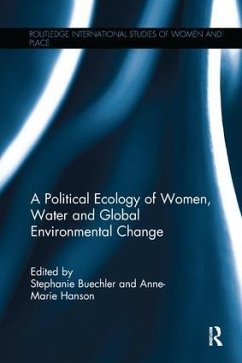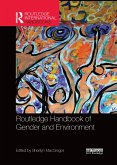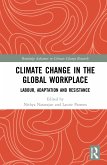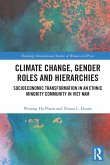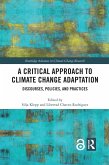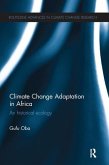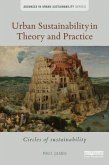This edited volume explores how a feminist political ecology framework can bring fresh insights to the study of rural and urban livelihoods dependent on vulnerable rivers, lakes, watersheds, wetlands and coastal environments. Bringing together political ecologists and feminist scholars from multiple disciplines, the book develops solution-oriented advances to theory, policy and planning to tackle the complexity of these global environmental changes.
Using applied research on the contemporary management of groundwater, springs, rivers, lakes, watersheds and coastal wetlands in Central and South Asia, Northern, Central and Southern Africa, and South and North America, the authors draw on a variety of methodological perspectives and new theoretical approaches to demonstrate the importance of considering multiple layers of social difference as produced by and central to the effective governance and local management of water resources.
This unique collection employs a unifying feminist political ecology framework that emphasizes the ways that gender interacts with other social and geographical locations of water resource users. In doing so, the book further questions the normative gender discourses that underlie policies and practices surrounding rural and urban water management and climate change, water pollution, large-scale development and dams, water for crop and livestock production and processing, resource knowledge and expertise, and critical livelihood studies.
This book will be of interest to students and scholars of environmental studies, development studies, feminist and environmental geography, anthropology, sociology, environmental philosophy, public policy, planning, media studies, Latin American and other area studies, as well as women's and gender studies.
Using applied research on the contemporary management of groundwater, springs, rivers, lakes, watersheds and coastal wetlands in Central and South Asia, Northern, Central and Southern Africa, and South and North America, the authors draw on a variety of methodological perspectives and new theoretical approaches to demonstrate the importance of considering multiple layers of social difference as produced by and central to the effective governance and local management of water resources.
This unique collection employs a unifying feminist political ecology framework that emphasizes the ways that gender interacts with other social and geographical locations of water resource users. In doing so, the book further questions the normative gender discourses that underlie policies and practices surrounding rural and urban water management and climate change, water pollution, large-scale development and dams, water for crop and livestock production and processing, resource knowledge and expertise, and critical livelihood studies.
This book will be of interest to students and scholars of environmental studies, development studies, feminist and environmental geography, anthropology, sociology, environmental philosophy, public policy, planning, media studies, Latin American and other area studies, as well as women's and gender studies.
"Women around the world are facing the sharp edge of climate change impacts, especially impacts on water. So this truly feminist political ecology of gender, water and vulnerability is timely, important, and sobering. It's also exciting! From Lesotho to Mexico to Canada, justice and gender are on the agenda."
Paul Robbins, University of Wisconsin-Madison, USA
"This is an exciting example of how approaching environmental change through a gender lens usefully unsettles taken-for-granted boundaries. Placing people's experiences at the heart of the analysis, the book engages with recent insights from a wide range of disciplines to rethink global environmental change. It is indispensable reading for those interested in how water, social difference, and power interact to produce highly uneven waterscapes."
Margreet Zwarteveen, UNESCO-IHE Delft, The Netherlands
"This collection moves feminist political ecology forward in an unassuming and practical way. The authors open us to hidden connections between social inequalities and natural resource actions - especially how gender shapes our interactions with water in its many forms -interactions which in turn shape who we are as individuals and as societies."
Claudia Radel, Utah State University, USA
"Using multi-disciplinary analysis, this powerful collection illustrates how water intersects with women's everyday vulnerabilities. From North America to Central Asia, women's voices have shaped struggles over access to water, whether for agriculture or mining or domestic use in contexts of growing competition, conflict and increasing risks to climate change."
Sara Ahmed, International Development Research Centre, Asia Regional Office, India
"This is a thoughtful, theoretically, and methodologically timely book examining women's struggles and agency in light of rapid environmental change. The depth and complexity of the case studies provide compelling evidence of how gender shapes the manner in which water resources are contested; and how women's knowledge and actions lead to better understanding of the many factors shaping the relationship between people and natural resources in the Global South and North. This important edited volume will contribute significantly to the growing field of Feminist Political Ecology and will be of interest to a wide range of scholars in the social sciences and humanities."
Maria L. Cruz-Torres, Arizona State University, USA
Paul Robbins, University of Wisconsin-Madison, USA
"This is an exciting example of how approaching environmental change through a gender lens usefully unsettles taken-for-granted boundaries. Placing people's experiences at the heart of the analysis, the book engages with recent insights from a wide range of disciplines to rethink global environmental change. It is indispensable reading for those interested in how water, social difference, and power interact to produce highly uneven waterscapes."
Margreet Zwarteveen, UNESCO-IHE Delft, The Netherlands
"This collection moves feminist political ecology forward in an unassuming and practical way. The authors open us to hidden connections between social inequalities and natural resource actions - especially how gender shapes our interactions with water in its many forms -interactions which in turn shape who we are as individuals and as societies."
Claudia Radel, Utah State University, USA
"Using multi-disciplinary analysis, this powerful collection illustrates how water intersects with women's everyday vulnerabilities. From North America to Central Asia, women's voices have shaped struggles over access to water, whether for agriculture or mining or domestic use in contexts of growing competition, conflict and increasing risks to climate change."
Sara Ahmed, International Development Research Centre, Asia Regional Office, India
"This is a thoughtful, theoretically, and methodologically timely book examining women's struggles and agency in light of rapid environmental change. The depth and complexity of the case studies provide compelling evidence of how gender shapes the manner in which water resources are contested; and how women's knowledge and actions lead to better understanding of the many factors shaping the relationship between people and natural resources in the Global South and North. This important edited volume will contribute significantly to the growing field of Feminist Political Ecology and will be of interest to a wide range of scholars in the social sciences and humanities."
Maria L. Cruz-Torres, Arizona State University, USA

